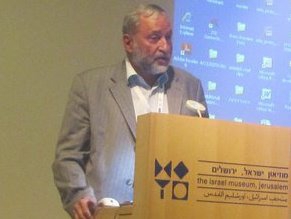|
Euroasian Jewish News

Report of Josef Zisels (photo by Michael Feldman)
|
EAJC General Council Chairman Speaks at Jerusalem Conference
20.10.2010 The Euro-Asian Jewish Congress (EAJC) General Council Chairman Josef Zisels has made a report on “Historic Memory and the Problem of Reconciliation” as part of the scientific conference “Ukrainian-Jewish Meeting: Cultural Interactions, Perceptions, Memory,” which took place in Jerusalem. The event was organized by the “Ukrainian-Jewish Meeting Initiative,” a Canadian association, with the support of the Museum of Israel and the University of Jerusalem.
The conference saw discussion of both historic questions and present-day affairs. The speakers included Israel Minister of Information and Diaspora Yuli-Yoel Edelstein, the Ambassador of Ukraine to the State of Israel Gennadiy Nadolenko, Hebrew University of Jerusalem professor Wolf Moskovich, EAJC General Council member and Director of the Jewish Studies Center at the National University "Kyiv-Mohyla Academy" (NAUKMA) Leonid Finberg, famous Israeli politologist Dr. Zeev Khanin, and many others. All in all, over 50 reports were read over the course of 11 thematic sessions by scholars from Israel, Ukraine, Canada, USA, and Poland. The “Ukrainian-Jewish Meeting Initiative” was created in 2008 by Adrian Korotnystky and Alti Rodal. The “Initiative” was conceptualized to be a sophisticated joint Ukrainian-Jewish project that would aid a deeper understanding of the Ukrainian-Jewish relationship through the ages. In a wider sense, the point of the venture is to allow two peoples which had previously existed without nations to use their common memory and historic experience to better understand each other, to free themselves from stereotypes, and to create a firm foundation for future cooperation based on mutual understanding and respect. The Jerusalem conference was preceded by similar forums in Toronto and Oxford, also organized by the “Ukrainian-Jewish Meeting Initiative.”
As Professor W. Moskovich noted in his comment, “the Ukrainian and Jewish community both believe that studying the history of our people’s cultures is very important. It allows us to not only understand the past better, but to move forward, to build our future.”
|
|
